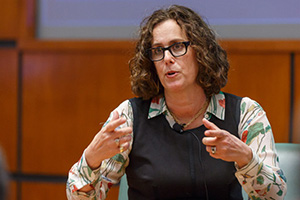Harnessing the Power of Impact Investing
Published: November 9, 2015 / Author: Angela Sienko

With its history rooted in ethics, integrity and service, it’s no surprise that the University of Notre Dame’s Mendoza College of Business is leading the charge when it comes to developing business solutions for the world’s most pressing social issues. The College’s Gigot Center for Entrepreneurship gathers students, alumni, social entrepreneurs and social investors from across the globe to its annual Irish Impact Conference to discuss current issues and trends in social entrepreneurship. This year’s event, held October 29-30 on campus, focused on impact investing.
The event kicked off with a keynote address by Andi Phillips, a vice president in the Urban Investment Group at Goldman Sachs, who discussed her involvement with an initiative to help combat the soaring recidivism rate among America’s youth—a project that led to the creation of one of the first social impact bonds in the U.S.
With the goal to reduce the recidivism rate of young at-risk men in Massachusetts, Phillips believed Goldman Sachs could help address the problem by doing what it does best—investing. More specifically, impact investing, which involves deploying capital to address social problems while providing a competitive rate of return for investors.
“Despite its name, a social impact bond isn’t actually a bond at all—it’s a working capital loan used to fund the day-to-day operations of a social services organization,” Phillips explains. “The risk of funding such loans is high—if the initiative isn’t successful, the loan is forgiven—but the potential benefits far outweigh the risk.”
In the case of the Massachusetts Juvenile Justice Social Impact Bond, the funds were used to support Roca Inc., an organization that seeks to transform lives and help at-risk young men and women stay out of jail by providing them support and training and by helping them obtain employment.
The Urban Investment Group is involved in multiple social initiatives right now, including rebuilding neighborhoods such as Harlem, which once suffered from disinvestment.
“The Urban Investment Group really pre-dates impact investing. Goldman Sachs created it 14 years ago because it saw an opportunity to give back to our own neighborhoods and communities,” Phillips explains. “It made strategic investments to build up neighborhoods that were in varying states of distress, while getting returns on the capital—a true win-win situation.”
After Phillips’ presentation, the Gigot Center for Entrepreneurship announced the winner of the Haley Prize, an award that recognizes the entrepreneurial spirit and significant social impact of a specific organization. While the Urban Investment Group was selected as this year’s recipient, Goldman Sachs requested that the award and its cash prize be shared between Roca Inc. and The Osborne Association, another organization supported by a social impact bond focused on reducing recidivism.
The conference culminated with the Zielsdorf Family Pitch Competition, at which six social enterprise finalists made live funding pitches before a panel of expert judges. The judges evaluated the teams based on the merits of its value proposition, customer segmentation and financial and social/environmental mission.
The winner of the Grand Prize and $10,000 was Edovo (Jail Education Solutions), an organization that provides meaningful access to education and self-improvement tools that can unlock the potential of every person affected by incarceration. POLCO, an organization that helps concerned citizens participate in their public policies via a simple but effective suite of voting and commenting tools, won the second-place prize of $2,000.
The Irish Impact Conference is co-sponsored by the Gigot Center for Entrepreneurship at the Mendoza College of Business and the Fellow Irish Social Hub (FISH), an independent, nonprofit incubator for social entrepreneurs.




